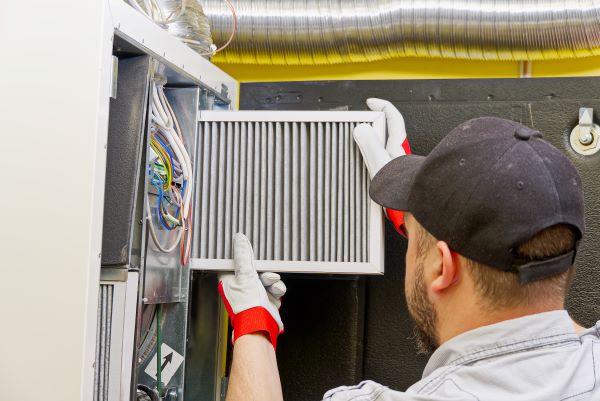You depend on your HVAC system all year. It provides you with a cozy retreat during the coldest winter evenings and a crisp, cool retreat from the blazing heat of summer afternoons.
It gives you more than just comfort too. During severe weather conditions, a good HVAC system is a source of safety, shielding you from the dangers of extreme heat and cold. It even helps to clean the air in your home, serving as a filtration system for dirt and dust particles that enter the air.
Of course, your HVAC system depends on you too. Like any mechanical system, it will experience wear and tear over time, which can ultimately prevent it from functioning at peak capacity. Left unchecked, this cumulative damage can shorten the life of the system and lead to costly breakdowns.
At All Weather Heating & Cooling, we’re here to help. We offer HVAC preventative maintenance to ensure the efficiency of your system and extend its life span for years to come.
The Parts of Your HVAC System
The “H” in HVAC stands for heating, so let’s start there: your HVAC system needs to have some method of generating heat energy. That means some type of furnace, which usually uses natural gas, propane, oil, or electricity as its energy source.
Let’s skip ahead a bit: the “AC” stands for (you guessed it) air conditioning. An AC unit is a fairly elaborate piece of technology composed of many different elements, including a compressor, a condenser, and an evaporator. It’s these parts that cool air that is circulated through the system so that it can lower the overall temperature in the home.
That brings us back to the letter “V”: ventilation. Most buildings make use of what is known as a forced-air system, where the air is circulated by a large fan through an elaborate system of ductwork, which is typically hidden behind the walls and ceilings. Filters installed at various points catch dust, dirt, and other impurities. Finally, the ducts terminate at vents, which are located in each room.
Your HVAC system also has electronic components, such as the thermostat you use to select your desired temperature. If your system is really modern, you might even have a “smart” thermostat”, which can learn your heating and cooling preferences and even be controlled remotely with a mobile device.
What Is Preventative Maintenance?
Each part of your HVAC system experiences wear whenever it’s used. This can reduce the efficiency of the system, which can drive your energy bill up. It can also eventually lead to breakdowns that necessitate expensive repairs or even replacement.
HVAC preventative maintenance helps to stop this type of damage from reaching the point where it starts to cost you extra. Your HVAC professional will work their way down a checklist, inspecting each element of the system and fixing any problems they find.
What’s On the Checklist?
During a preventive maintenance appointment, a technician will inspect each element of your HVAC system: heating, ventilation, and air conditioning.
During furnace maintenance, they’ll clean the unit, change or clean the air filters, oil the motor, and check the tightness of the belts. They’ll also check all the electrical connections and confirm your thermostat settings are accurate. You can expect them to test that the blower fan is functioning properly as well. Finally, the technician will check the hookup to your fuel source to ensure there are no leaks or other issues.
Your AC unit will also be on their checklist. The evaporator and condenser coils will be cleaned and inspected for damage. This is especially important for your outside unit, which is exposed to environmental wear and tear year-round. Your HVAC professional will measure refrigerant levels, test for leaks, and refill as necessary. They’ll also clean and confirm the compressor is running smoothly and change or clean the air filters.
Since the ventilation part of your HVAC system is integral to both the heating and cooling functions, there is some overlap. The technician will clean and/or change air filters throughout the house. If you have a forced-air unit, they’ll ensure the blower fan is working at full capacity and that every room in the house is receiving proper airflow. They will also check your air ducts for any leaks or blockages and seal or clean them as needed.
The Benefits of Regular Maintenance
We’ve mentioned that one of the first things that happens to an HVAC system that hasn’t been maintained properly is that it becomes less efficient. This simply means that it’s working harder to perform the same job.
If the burner on your furnace is so dirty it’s clogged, it uses more fuel. If your air conditioner is leaking refrigerant, it uses more electricity to cool the air. If the air ducts become too bogged down with dust and dirt, then the air won’t circulate effectively throughout your home, and the fan must work harder to transport the heated or cooled air, drawing more electricity and causing unnecessary wear.
In all of these cases, the system becomes more expensive to run while also doing its job less effectively. The main benefit of regular maintenance is ensuring your HVAC system is doing the least amount of work necessary to keep your home comfortable. An overworked system, besides being more expensive, will simply wear out faster and need to be replaced that much sooner.
A well-maintained HVAC system is also a healthier one: clean filters and ducts mean less dust and dirt is introduced into the indoor air supply. This means a reduced likelihood of allergies, asthma, and other respiratory problems.
How Often Should I Schedule Maintenance?
Ideally, HVAC preventative maintenance should be performed by a licensed professional at least once every year. We recommend scheduling a visit from an HVAC professional during the spring or fall. As you can imagine, winter and summer are the busiest months for us since we’re frequently being called to perform emergency repairs.
To schedule a maintenance appointment or for any questions you might have about the topic, contact All Weather Heating & Cooling. We’ll help ensure your HVAC system is working efficiently for years to come.

